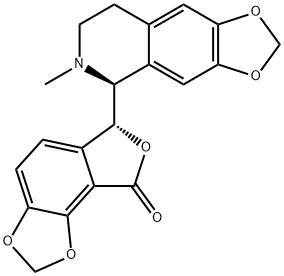| Melting point |
193-197 °C |
| alpha |
D25 +130.5° (CHCl3) |
| Boiling point |
497.92°C (rough estimate) |
| Density |
1.3694 (rough estimate) |
| refractive index |
1.5600 (estimate) |
| storage temp. |
2-8°C |
| solubility |
Benzene, Chloroform, DMSO, Ethyl Acetate |
| pka |
4.84(at 25℃) |
| form |
Off-white to yellow powder. |
| color |
Pale Yellow |
| optical activity |
[α]20/D +126±6°, c = 1% in chloroform |
| λmax |
325nm(lit.) |
| Merck |
14,1203 |
| BRN |
98786 |
| InChI |
1S/C20H17NO6/c1-21-5-4-10-6-14-15(25-8-24-14)7-12(10)17(21)18-11-2-3-13-19(26-9-23-13)16(11)20(22)27-18/h2-3,6-7,17-18H,4-5,8-9H2,1H3/t17-,18+/m0/s1 |
| InChIKey |
IYGYMKDQCDOMRE-ZWKOTPCHSA-N |
| SMILES |
[H][C@]1(OC(=O)c2c3OCOc3ccc12)[C@@]4([H])N(C)CCc5cc6OCOc6cc45 |
| CAS DataBase Reference |
485-49-4(CAS DataBase Reference) |
| EPA Substance Registry System |
Furo[3,4-e]-1,3-benzodioxol-8(6H)-one, 6-[(5S)-5,6,7,8-tetrahydro-6-methyl-1,3-dioxolo[4,5-g]isoquinolin-5-yl]-, (6R)- (485-49-4) |

